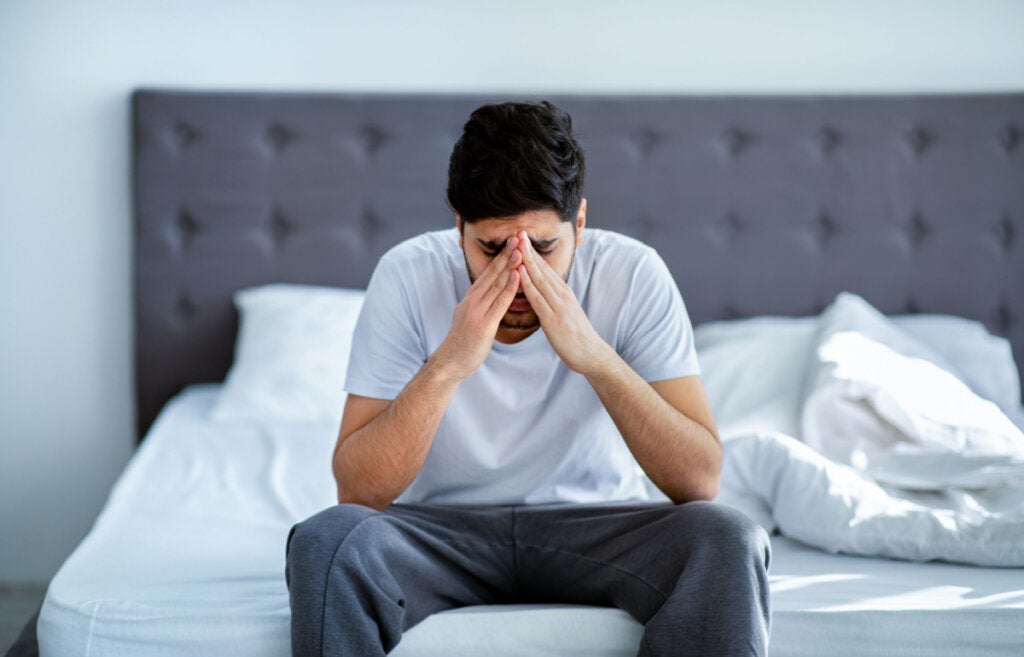Undoubtedly, you’ve found yourself, at some time or another, feeling nervous before an exam, appointment, or important meeting. Indeed, it’s perfectly natural to sometimes feel fear of failing to measure up. However, some people intensely fear events that are far from threatening. It’s known as performance anxiety.
This feeling can appear at any age. That said, it does tend to be linked to certain personality traits and coping skills. For instance, when faced with the same situation, one person might be calm, while another will suffer anticipatory anxiety for weeks.
Fortunately, it’s possible for them to address this interpretation of reality and alleviate any feelings of discomfort.
Performance anxiety
Performance anxiety is the fear of failing or not being able to accomplish a specific task, which would (in the sufferer’s opinion) mean humiliation and interpersonal failure. The presence, gaze, or evaluation of others is key in this regard. That’s because, despite the fact that the sufferer might know how to master the activity perfectly well, knowing that they must be accountable to others triggers their fear of failure.
In itself, this anxiety isn’t necessarily negative. In fact, it can be necessary to motivate and push us to perform well. It’s explained by the well-known law proposed by Yerkes and Dodson. This claims that the relationship between arousal and performance takes an inverted U shape. It suggests that anxiety improves performance, but only up to a certain point, after which it worsens.
When fear, worry, and activation are excessive, the reaction becomes dysfunctional. This interferes with well-being and achievement. It generates symptoms and consequences at different levels.
These are some of the manifestations of performance anxiety:
- Physiological sensations. For example, sweating, tachycardia, digestive problems, and headaches.
- Negative thoughts. The individual assumes that they won’t perform well, that they’ll be harshly judged or rejected, and that their wrongdoing will have serious consequences.
- Avoidance of the situation that generates anxiety, to avoid said consequences. However, this only strengthens the belief that they’re not capable of achieving it because they don’t give themselves the opportunity to try.
- Poor performance due to fear. They’re constantly on alert. This makes it difficult for them to concentrate. Moreover, they’re excessively aware of themselves. As a result, they fail to put into practice the skills they really possess. In turn, this poor performance reinforces their initial ideas of inability, so a self-fulfilling prophecy occurs.
The effect of performance anxiety
As we mentioned earlier, when arousal is high, instead of driving us, it paralyzes, hinders, and limits us. In fact, it may affect any area in which performance anxiety appears. For instance, it might cause you to fail an exam for which you were well prepared. Or, it can prevent you from demonstrating your potential in a job interview or make you forget your words in the presentation you’re about to give in public.
It can also affect more routine moments. For example, some people experience great fear when it comes to answering phone calls, driving, or socializing.
In many cases, this fear appears because they perceive the act as an event in which they have to perform, live up to certain expectations, or comply with specific parameters. This prevents them from being spontaneous, authentic, and calm. On the contrary, it increases their chances of either failing or wanting to avoid those necessary situations.
This kind of fear can even be closely related to sexual performance and various sexual dysfunctions. In these cases, the anxiety generated by the fear of not measuring up can lead to impotence, premature ejaculation, dyspareunia, or hypoactive sexual desire disorders.

What can you do if you suffer from performance anxiety?
The degree to which this performance anxiety appears is related to the way you see the world and yourself. There are certain keys and techniques that help reduce it:
- Avoid work perfectionism. When you push yourself too hard and are your own worst critic, you put unbearable pressure on yourself. However, when you manage to relativize, you become aware that you have the right to err and be more compassionate with yourself, and your anxiety decreases.
- Develop a growth mindset. This implies understanding that no qualities (eg. intelligence, creativity) are fixed and they all develop and improve with practice. Therefore, it’s normal and acceptable that you can’t always give 100 percent of yourself.
- Practice relaxation exercises to decrease your levels of physical and mental activation. These can help you deal with situations you fear more calmly, as well as reduce the general anxiety you feel throughout the day.
- Review and restructure your thoughts. You could be falling into biases such as catastrophizing or dichotomy when interpreting your performance in the tasks you fear. Remember to evaluate your thoughts before taking them for granted. Modify those that don’t help you with others that are more functional, flexible, and adjusted to reality.
- Face the situations you fear instead of avoiding them. This is the best way to reduce performance anxiety. In fact, by exposing yourself to them, you allow yourself to verify that the consequences won’t be as tragic as you might’ve imagined. By getting used to the situation and reducing your fear, you become capable of performing adequately.
Psychological help
Despite following these instructions, it’s possible that certain situations are particularly difficult for you and you continue to experience anxiety. If this happens, don’t hesitate to seek psychological support. A professional can help you analyze your situation and provide you with tools to learn to manage your limiting fears.
The post Performance Anxiety: Fear of Failing appeared first on Exploring your mind.



















Comments